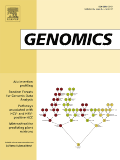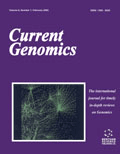
International Journal of Genomics
Scope & Guideline
Exploring the frontiers of genetics and molecular biology.
Introduction
Aims and Scopes
- Genomic Characterization and Analysis:
The journal publishes studies on the comprehensive analysis of genomes across various organisms, including plants, animals, and microorganisms, to unravel genetic diversity and evolutionary relationships. - Clinical Genomics and Biomarkers:
Research articles often focus on identifying genetic markers associated with diseases, understanding their prognostic implications, and exploring therapeutic targets in cancer and other health conditions. - Bioinformatics and Computational Genomics:
The journal emphasizes the use of bioinformatics tools and computational methods for analyzing and interpreting genomic data, facilitating the discovery of gene functions and regulatory networks. - Plant and Agricultural Genomics:
A significant portion of research addresses the genetic basis of traits in crops and plants, focusing on improving agricultural productivity and stress tolerance through genomic insights. - Translational Genomics:
The journal aims to bridge basic genomic research with clinical applications, promoting studies that translate genomic findings into practical health solutions and therapeutic strategies.
Trending and Emerging
- Cancer Genomics and Precision Medicine:
There is an increasing focus on the genomic characterization of various cancers, aiming to uncover new biomarkers and therapeutic targets, aligning with the broader trend towards precision medicine. - Multi-Omics Approaches:
Research utilizing integrated multi-omics strategies (genomics, transcriptomics, proteomics) is on the rise, as these approaches provide a more comprehensive understanding of biological systems. - Environmental and Stress Response Genomics:
Studies investigating the genomic basis of plant responses to environmental stresses (e.g., drought, salinity) are becoming more prominent, reflecting the urgency of addressing climate change impacts on agriculture. - Functional Genomics and Gene Editing Technologies:
The application of CRISPR and other gene editing technologies in functional genomics studies is trending, showcasing innovative methodologies for gene manipulation and functional analysis. - Microbiome Genomics:
Research focusing on the genomic analysis of microbiomes and their interactions with host organisms is gaining traction, highlighting the importance of microbial communities in health and disease.
Declining or Waning
- Traditional Genetic Mapping Techniques:
Research focusing solely on classical genetic mapping approaches is decreasing as next-generation sequencing and genomic technologies offer more comprehensive insights. - Single-Organism Studies:
There is a noticeable reduction in studies that focus exclusively on single organisms without comparative or integrative approaches, as researchers increasingly adopt broader comparative analyses. - Static Genomic Data Analysis:
The emphasis on static analyses of genomic data without incorporating dynamic systems biology approaches is waning, as the field moves towards more integrative and holistic views of genome function. - Basic Genetic Variants Identification:
The frequency of publications centered on merely identifying genetic variants without exploring their functional implications or associations with phenotypes is declining. - General Reviews without Novel Insights:
There is a decreasing trend in the publication of general review articles that do not provide novel insights or synthesis of current research, as the focus shifts towards original research contributions.
Similar Journals

MOLECULAR BREEDING
Pioneering Research in Plant Science and BiotechnologyMOLECULAR BREEDING is a prestigious journal published by Springer, dedicated to advancing the field of agronomy, plant science, and biotechnology through innovative research contributions. With an impressive ISSN of 1380-3743 and E-ISSN 1572-9788, this journal has continuously served the scientific community since its inception in 1995. Operating from the Netherlands, MOLECULAR BREEDING is recognized for its high impact factor and status in the Q1 quartile for both Agronomy and Crop Science and Plant Science in the latest 2023 metrics, highlighting its influential role in these domains. With strong Scopus rankings reflecting its position within the top percentiles of various related fields—including a notable 81st percentile in Plant Science—this journal is essential for researchers, professionals, and students striving to understand and innovate in molecular genetics and breeding techniques. Although it does not provide open access, its rigorous peer-review process ensures that published articles maintain the highest standards and contribute significantly to the scientific discourse. The journal’s diverse scope encompasses significant advancements in molecular biology and genetics, ultimately supporting the global objectives of sustainable agriculture and enhanced crop resilience.

GENOMICS
Illuminating the Path of Genetic InnovationGENOMICS is a prestigious journal published by Academic Press Inc Elsevier Science, dedicated to advancing the field of genetic research and molecular biology. With an impressive impact factor, this journal is recognized for its rigorous peer-review process and high-quality publications that cover a wide range of topics within the genomics discipline. Operating from the United States, GENOMICS has established itself as a vital resource for researchers, professionals, and students alike, standing at Q2 in the Genetics category according to the latest rankings. With a rich history dating back to 1987 and convergence extending to 2024, the journal highlights cutting-edge discoveries and methodologies, ensuring that its readership remains at the forefront of genetic advancements. Although currently not an open-access journal, articles published within its pages are often accessible through various academic platforms, enhancing worldwide reach and dissemination. For those engaged in the fields of biochemistry, genetics, and molecular biology, GENOMICS serves as an indispensable platform for impactful research and collaborative initiatives.

Genetics Research
Advancing Knowledge in Genetics and Molecular BiologyGenetics Research, published by HINDAWI LTD, is a distinguished open access journal that has been at the forefront of genetic studies since its inception in 1960. With the transition to open access in 2019, this journal has expanded its accessibility, fostering knowledge dissemination across the global scientific community. Operating out of the United Kingdom, it provides a platform for innovative research in the fields of genetics and molecular biology, encompassing a broad range of topics that are highly relevant to medical sciences. As of 2023, it holds a Q4 classification in Genetics and a Q3 classification in miscellaneous Medicine, reflecting its ongoing commitment to scholarly excellence amidst shifting academic landscapes. While the journal's H-index remains unlisted, its indexed ranking within Scopus, with a rank of #325/328 in the Genetics category highlights the challenges ligated to its niche audience. Nevertheless, it serves as a crucial resource for researchers, professionals, and students eager to contribute to and stay informed on the latest genetic research trends and breakthroughs.

NATURE REVIEWS GENETICS
Unveiling the Complexities of Genetic Science.NATURE REVIEWS GENETICS, published by NATURE PORTFOLIO, stands as a leading journal in the field of genetics, boasting a remarkable reputation reflected in its Q1 ranking across multiple categories including Genetics, Clinical Genetics, and Molecular Biology. With an impressive percentile of 99th in both Genetics and Clinical Genetics, as well as a solid rank in Molecular Biology, this journal is pivotal for researchers, professionals, and students alike who seek to stay informed on the latest advancements and comprehensive reviews in genetic research. The journal's scope encompasses a wide array of topics, providing in-depth insights from fundamental genetic principles to clinical applications, underscoring its importance in bridging basic science and medical practice. Though not an open-access publication, it remains accessible through various academic institutions, enhancing its reach and influence within the scientific community. With publication years spanning from 2000 to 2024, NATURE REVIEWS GENETICS continues to shape the future of genetics research and education.

CURRENT GENOMICS
Illuminating the path of genetic discovery.CURRENT GENOMICS is a premier journal published by Bentham Science Publishers that focuses on the expansive field of genomics, including both clinical and molecular genetics. With the ISSN 1389-2029 and E-ISSN 1875-5488, this esteemed journal has been disseminating significant scientific insights since its inception in 2000 and continues to contribute to the field through 2024. Based in the United Arab Emirates, CURRENT GENOMICS boasts a Q3 ranking in both the genetics and clinical genetics categories for 2023, reflecting its growing impact in the scientific community. Although not an open-access journal, it provides valuable content that supports researchers and professionals in navigating the complexities of genetic research and its applications. By publishing original research articles, reviews, and case studies, CURRENT GENOMICS aims to foster a deeper understanding of genomic science and its implications for medicine, thus playing a critical role in the advancement of genetics and biomedical research.

GENOME BIOLOGY
Advancing the frontiers of genomics and molecular biology.GENOME BIOLOGY is a premier, peer-reviewed journal published by BMC, focusing on the rapidly evolving fields of genomics, molecular biology, and bioinformatics. Accessible as an Open Access journal since 2000, it aims to disseminate high-quality, cutting-edge research that contributes to our understanding of genome biology's intricate mechanisms. The journal boasts an impressive impact, ranking 8th in Agricultural and Biological Sciences and 9th in Biochemistry, Genetics and Molecular Biology, highlighting its significance among scholars, professionals, and students alike. With a commitment to facilitating the exchange of invaluable scientific knowledge, GENOME BIOLOGY provides an important platform for discussions on evolutionary biology, genetic systems, and cell biology, contributing to the advancement of these dynamic disciplines.

CYTOGENETIC AND GENOME RESEARCH
Advancing the frontiers of cytogenetics and genomics.CYTOGENETIC AND GENOME RESEARCH is a pivotal journal dedicated to the exploration of cytogenetics, genomics, and their applications within clinical genetics and molecular biology. Published by KARGER in Switzerland, this journal aims to foster comprehensive discussions and disseminate impactful research from diverse fields related to genetics. It operates under an open access model, ensuring that researchers, professionals, and students can easily access and contribute to the latest findings. With coverage spanning from 1962 to 2024, CYTOGENETIC AND GENOME RESEARCH continues to serve as a vital resource, despite its current categorization in the Q4 quartile across Genetics and Molecular Biology. It provides an avenue for advancing the understanding of genomic mechanisms and their implications for human health. The journal encourages submissions that delve into cutting-edge methodologies, data interpretation, and theoretical frameworks, thereby playing a crucial role in the advancement of genetic research and its clinical applications.

GENES & GENETIC SYSTEMS
Connecting Researchers Through Open Access KnowledgeGENES & GENETIC SYSTEMS, an esteemed journal published by the Genetics Society of Japan, serves as a vital platform for the dissemination of innovative research within the fields of genetics, molecular biology, and medicine. Established in 1996 and based in Mishima, Shizuoka, Japan, this journal has actively contributed to the academic community, fostering collaboration and knowledge sharing among researchers and professionals. The journal’s impact can be seen through its category quartiles, which reflect its position in Genetics, Molecular Biology, and Medicine, and while it currently ranks in Q4 in Genetics and Q3 in Medicine (miscellaneous), it is poised for growth as it continues to publish pivotal studies. With a commitment to open access, GENES & GENETIC SYSTEMS ensures that research findings are freely accessible to the global scientific community, promoting a more inclusive approach to knowledge distribution. This journal is essential for students, researchers, and professionals seeking to stay informed of advancements in genetic research and its implications for the broader field of medicine.

JOURNAL OF MOLECULAR EVOLUTION
Exploring the Nexus of Molecular Mechanisms and EvolutionThe Journal of Molecular Evolution, published by Springer, is a prestigious peer-reviewed journal dedicated to advancing the understanding of molecular evolution through high-quality research and analysis. With an impact factor establishing it as a leading authority in the field, this journal provides a vital platform for scholars focused on the intricate relationships between molecular biology and evolutionary processes. Featuring a Q1 ranking in Ecology, Evolution, Behavior and Systematics, and significant rankings in Genetics and Molecular Biology, the journal has consistently positioned itself at the forefront of academic discourse since its inception in 1971. Notably, the journal boasts an extensive archive that converges from 1971 to 2024, providing a comprehensive resource for current and future research. Although it operates on a subscription model, the high caliber of contributions ensures that it remains an essential reference point for researchers, professionals, and advanced students eager to deepen their understanding of molecular mechanisms and evolutionary dynamics.

FUNCTIONAL & INTEGRATIVE GENOMICS
Pioneering Discoveries in Genetics and Molecular BiologyFUNCTIONAL & INTEGRATIVE GENOMICS, published by Springer Heidelberg, is a leading journal in the fields of genetics and molecular biology. Established in 2000, it serves as a pivotal platform for advancing our understanding of genomic functionality and integration, making significant contributions to both basic and applied research in genetics. With a robust impact factor and a ranking in the Q3 quartile for Genetics and Q2 for Medicine (Miscellaneous), the journal aims to publish innovative research that explores the relationships between genomic data and biological functions, appealing to a diverse audience of researchers and professionals. Although it operates under a subscription model, the journal's extensive archives remain a valuable resource for academics seeking to stay abreast of the latest findings and methodologies in genomics. As the field evolves, FUNCTIONAL & INTEGRATIVE GENOMICS remains committed to fostering scholarly dialogue and the dissemination of groundbreaking studies that influence future research trajectories.